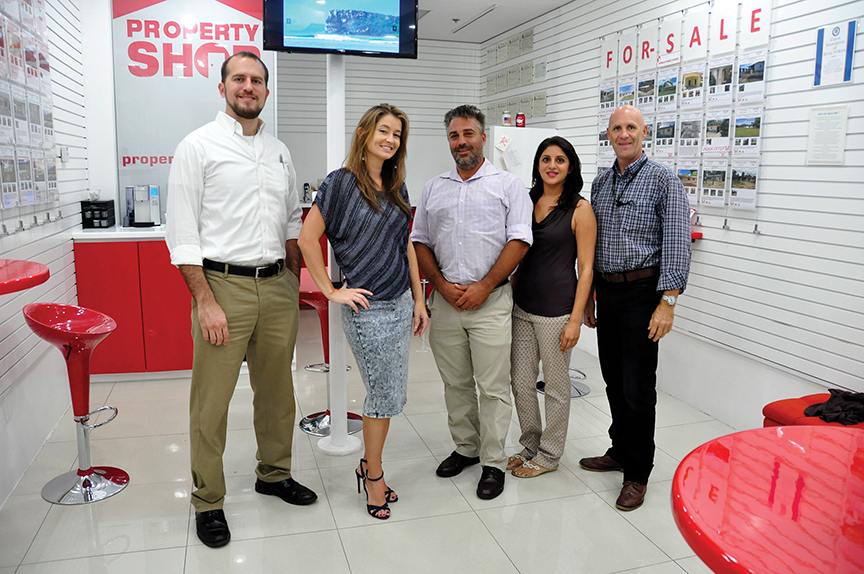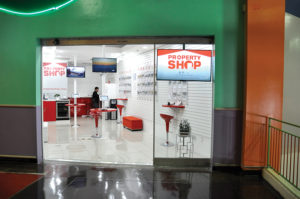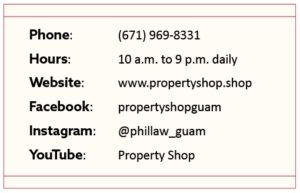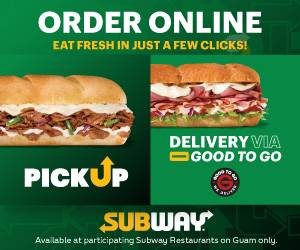Property Shop
Guam Premier Outlets
Tamuning, Guam
By Wayne Chargualaf
Property Shop is an idea that Phillip Law had for years. A real estate brokerage company that operates out of a space in Guam Premier Outlets, Property Shop is located at the top of the stairs from the food court and nestled among the types of stores most people would think of as at home in an outlet mall.
“It’s not uncommon [to have real estate brokerage offices in retail spaces] in other parts of the world,” Law says. “Australia, New Zealand, parts of Europe and the U.K. all have high street [equivalents to ‘main street’ in the U.S.] real estate stores. So I thought bringing that service here was quite logical.”
 Law first arrived on Guam in 1996 and started a security company called Secure West International. After Secure West was acquired by G4S in 2008, Law continued to work for G4S as a managing director in China and Australia before deciding to return to Guam. A passion for real estate caused him to acquire a real estate license and then open Property Shop, with an initial investment of $25,000.
Law first arrived on Guam in 1996 and started a security company called Secure West International. After Secure West was acquired by G4S in 2008, Law continued to work for G4S as a managing director in China and Australia before deciding to return to Guam. A passion for real estate caused him to acquire a real estate license and then open Property Shop, with an initial investment of $25,000.
Property Shop was first opened as as a traditional brokerage in November 2016. Originally meant to be a kiosk, the 316 square foot space it currently occupies became available — after being vacated by Sports America, a sporting goods and gift shop — and Law jumped at the chance, opening at the shop’s current location in March 2017.
What inspired you to open Property Shop and how is it different from other brokerage firms?
One of my main focuses when I set up Property Shop was to empower the customer. That’s something I’ve always striven to do in business — to empower the customer to make decisions, have information and manage my services. The big difference is that we have a facility where people can walk in. They can browse the walls for property, and they can use the tablets to do online research as well. So they’re in the driver seat, versus having to work with one agent who delivers to them the property that the agent desires. What I’ve found is that the customer’s initial vision can be completely different compared to what they end up buying at the end of the day. It’s easier for the customer to manage us through the buying process, rather than us trying to manage the customer. Otherwise you’re probably going to lose that customer because you’re not delivering what they’re looking for.
What services does Property Shop provide?
In essence, we’re a traditional brokerage company, it’s just the outlook that is different. We provide services for renters and buyers — you can list your rental property with us or you can sell your property with us traditionally, land and commercial. So we offer the services a traditional brokerage would. I suppose the key advantage for us is if a customer lists a property with us, they’re guaranteed to get it on the wall and get exposed to 500 to 1,000 people who walk in every week, so there’s greater exposure in that respect, as well as leveraging the multiple listing service. We also do property management. We offer a tiered menu, so we’re not just saying it’s going to be, say, 10% of your return. You might be a very hands-on owner and you don’t mind fixing all the little problems and what have you, so we’ll manage just the money side. Or, you might be a very hands-off owner and in that case we offer the full package. We offer an almost a la carte menu of property management services, which offers the customer the ability to balance his or her budget. It will cost less money if we’re not doing all the smaller stuff, it will cost more money if we’re providing the full package.”
How competitive is the market for real estate brokers?
It’s really competitive. Everybody knows a real estate agent or broker, sometimes they know several. So how does a new agent get the opportunity to start their customer base up? When I look at the market place, almost 50% of all transactions are covered by two companies and then another 25% is another two. So about 75% of the market is held within about four companies, and everyone else is struggling for what’s left. These older companies have a lot of tenure, and like with any sort of sales, the longer you’re in business, the more customer referrals, more customer base, etc. you can garner. So it’s super competitive and one of the biggest advantages my agents have is the walk-in traffic. I think we’ve achieved in six or eight months what it would have taken a lot of agents to do in two to three years, just because of the walk-in traffic, which is resulting in referrals, which is resulting in business.
What is your overall take on the real estate market in Guam and where it’s going? What key bullet points should someone keep in mind to understand the market right now?
There’s real tangible evidence that the Marines are coming, the builds are taking place and the contracts are being let out. We’ve been experiencing these peaks and troughs and bubbles over the last seven or eight years, but now it seems like [the relocation] is going to be a reality, and in the long term, property prices will climb. It won’t necessarily be because of the housing allowance. It will be because of the builds, the number of people coming and the number of businesses that will come in to support them. We’ll see an appreciation in property prices, but I feel it will be done in a very structured manner, so we won’t see a lot of bubbles again because of the length of time it will take for the build-up to take place. I’m seeing an increase in prices for condos right off the bat. Condos are a market that have been quite flat the past five or six years and their prices have really been picking up. Places like Las Palmas, Perez Acres, Tumon Horizon and some higher-end condos as well. I haven’t seen a massive change in the pricing around single-family homes at the moment, but there’s definitely a lack of inventory in the market, especially for the Veterans Affairs buyers. So I think over a short period we’ll see an increase in prices especially in the $300,000 to $400,000 market.
What has been your biggest challenge as a business owner so far?
With any business, it’s cash flow. You’re always trying to balance your funds, and real estate sales are a slow burn. The person I meet today might not buy for six months, and then it’s a 60 day closing, so that’s eight or nine months down the line before I get paid. So the activities you do today won’t pay for months. Then there’s the rental side of it and that can be quicker, but that should be more [of a bonus]. You can maybe pick up two or three rentals every month, but otherwise the business doesn’t see its returns for quite some time. So, like any business, the challenge is always cash flow, especially when you’re starting out. But we’re pretty much past that hump now so there hasn’t been any real drama. No inventory, three employees, right now life’s easy.



















